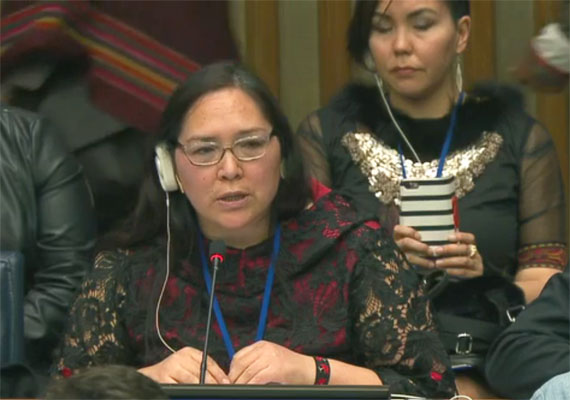In UN address, Inuit org seeks recognition for Inuktut
The language is official in Nunavut, but not at the federal level — and consequently doesn't receive funding comparable to other languages.

Inuktut in Nunavut needs stronger federal recognition and funding, the president of Nunavut’s Inuit birthright organization told a United Nations meeting last week.
Nunavut Tunngavik Inc. President Aluki Kotierk and other Inuit representatives are attending the United Nations Permanent Forum on Indigenous Issues in New York,which runs until April 27.
Kotierk focused her address to the forum on ensuring that the Inuktut majority in Nunavut receive the same public services and legal protections that other Canadians benefit from in English or French.
“Inuktut must be recognized as a founding language of Canada,” she said, “and [we] must ensure that our language is sufficiently and robustly supported, through resources, so that Inuit can receive public services in their language.”
Inuktut is indeed an official language in Nunavut, but does not enjoy that status federally, unlike English and French.
For the past 19 years, Kotierk said Nunavut represents a public jurisdiction within Canada with a majority of tax-paying citizens who speak an Indigenous language, while Ottawa doesn’t offer that language the same protections as its two official languages.
For example, the federal government subsidizes French-language education for francophones in Nunavut at rate of $8,189 per person, while providing $186 per Inuktut speaker.
Currently, Nunavut is home to 40 schools where the dominant language of instruction is English, with one French-language school based in Iqaluit.
Kotierk’s speech pointed to articles 13 and 14 of the UN Declaration on the Rights of Indigenous Peoples, which states that Indigenous nations have the right to use their own languages and establish education systems in their own language.
Roughly 70 percent of Nunavut Inuit identify Inuktut as their mother tongue, Kotierk told the forum, though that rate is declining by 1 percent each year.
As part of the Inuit-Crown Partnership Committee, Inuit leaders have been lobbying to beef up the status of Inuktut under the framework of the federal government’s soon-anticipated Indigenous Languages Act.
Following the committee’s last meeting in Ottawa last month, Makivik Corp. President Charlie Watt said he and other leaders have approached the Canadian government about having Inuktut recognized as an official language federally, and not just territorially.
Watt said that Ottawa has shown a willingness, but just what sort of protections might be awarded to Inuktut or other Indigenous languages remains to be seen.
Heritage Canada said it has been in discussions with Indigenous groups and language experts since June 2017 to gather feedback on how to best preserve and revitalize those languages—but the department wouldn’t comment on any plans for Inuktut in particular.
“The feedback from these sessions will help shape the on-going discussions on the scope of the act,” a Canadian Heritage spokesperson said in an email to Nunatsiaq News.
“The government of Canada remains committed to tabling legislation in Parliament before the end of the current mandate.”